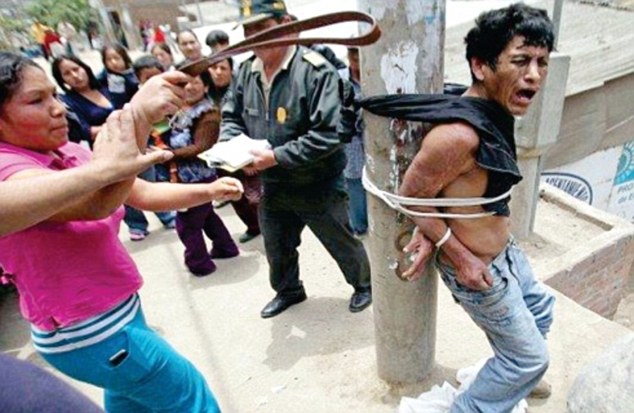A Facebook campaign to dish out vigilante justice in Peru has gone viral - after hundreds of people started posting pictures and videos of themselves catching and punishing petty criminals.
More and more fed-up Peruvians are taking the law into their own hands and recording their often humiliating acts of retribution on their cameras or mobile phones.
The 'Catch Your Thief' movement took off after one neighbourhood decided to stop calling the police after a crime, warning they would 'lynch' the culprits instead.
Social media users quickly began posting their own home-made footage showing alleged thieves and pickpockets receiving their comeuppance, often at the hands of a baying mob of revenge-seekers.
Punishments range from being stripped naked and whipped in public and being forced to perform tough military exercises to even being force-fed raw chili peppers.
One video shows a woman undressed and being walked through a busy street, with a banner around her neck reading 'I'm a thief'.
Another shows two whimpering alleged pickpockets being forced to stand on anthills until they beg for mercy as the insects bite their legs, feet and private parts.
The vigilantes claim the public acts of retribution are the best way of deterring would-be muggers or burglars, alleging that people have lost faith in the police to reduce crime.
But others warn that the craze has got out of hand and encourages criminal violence against the alleged offenders, without chance of a trial.
Over 100 similar Facebook pages have appeared in recent months, many with more brutal names, such as 'Catch your thief and leave him paralysed', 'Catch your thief and cut off his hands' and 'Catch your thief and castrate him'.
The pages are updated with new videos daily, despite Peru's penal code ruling up to four years in prison for inflicting bodily harm on individuals, and up to 25 years for causing death.
But with no prosecutions of the vigilantes so far, civilians have no problems being seen brazenly dishing out justice in public acts which have become increasingly violent.
On one page, a young teenager is seen being hit so hard his features become disfigured, while in another a man is held by his legs and arms and struck repeatedly on the back and legs with a pole.
Even so, the campaign continues to gain support across Peru, with a recent survey finding that 53 per cent of the population approve of the new way of dealing with criminals.
The vigilante trend began last month when Cecilia Rodrigues, a housewife from Huancayo, central Peru, helped her neighbour apprehend an intruder who had been found burgling her house.
The women, along with other locals, held the thief for two hours until the police arrived and took him away - but she later discovered that officers had let him go after just 30 minutes.
She said: 'From that day onwards, we decided to spread a message in the community - the next time we catch a criminal, we won't call the police but we will punish them ourselves.'
Her Facebook page Chapa Tu Choro (Catch Your Thief) struck a chord with other disgruntled victims of crime around the country and thousands have adopted Cecilia'a cause as their own.
In late August, a Facebook event called 'Catch Your Thief and Leave Him Paralytic' amassed 60,000 attendees before it was taken down.
Supporters blame distrust and disapproval of the country's police force and justice system, which they claim are letting down ordinary people, on the crime-stopping campaign's popularity.
A recent poll found that, while over a third of the population has fallen victim to a crime, just 34 per cent of Peruvians trust the country's law enforcement to catch and jail the perpetrators.
One high profile case which garnered further support for the vigilantes happened at the end of August, when 56 youths burst into a home on the outskirts of Lima, ransacking the house and causing £10,000 in damages.
Police caught the gang red-handed, yet on September 1 a judge inexplicably released 53 of the accused.
In some neighbourhoods, well-organised groups of vigilantes - known as 'rondas urbanas' - have formed which patrol the streets, dishing out punishments on alleged troublemakers - including adulterous spouses - before posting the videos onto YouTube.
Vigilantes have also been known to raid brothels, leaving welts on women they have whipped and often setting fire to mattresses and other furniture in the street.
Most of the occasions, though, continue to be impromptu attacks by angry locals following a criminal act.
(dailymail.co.uk)
www.ann.az
Follow us !











